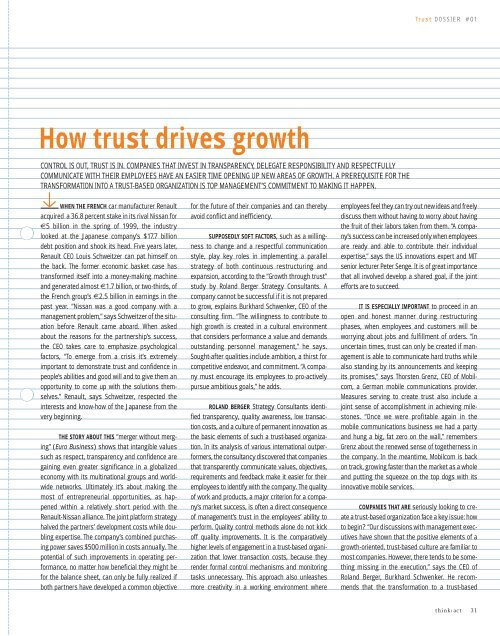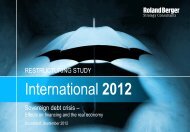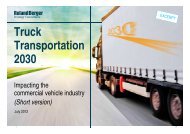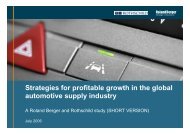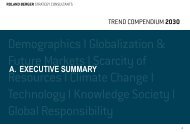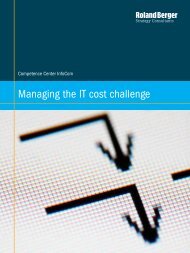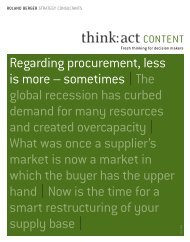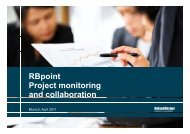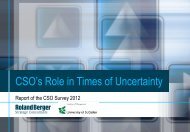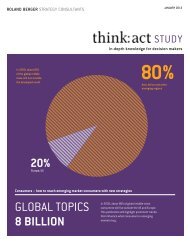issue 1 - Roland Berger
issue 1 - Roland Berger
issue 1 - Roland Berger
You also want an ePaper? Increase the reach of your titles
YUMPU automatically turns print PDFs into web optimized ePapers that Google loves.
Trust DOSSIER #01<br />
How trust drives growth<br />
CONTROL IS OUT, TRUST IS IN. COMPANIES THAT INVEST IN TRANSPARENCY, DELEGATE RESPONSIBILITY AND RESPECTFULLY<br />
COMMUNICATE WITH THEIR EMPLOYEES HAVE AN EASIER TIME OPENING UP NEW AREAS OF GROWTH. A PREREQUISITE FOR THE<br />
TRANSFORMATION INTO A TRUST-BASED ORGANIZATION IS TOP MANAGEMENT’S COMMITMENT TO MAKING IT HAPPEN.<br />
s<br />
WHEN THE FRENCH car manufacturer Renault<br />
acquired a 36.8 percent stake in its rival Nissan for<br />
€5 billion in the spring of 1999, the industry<br />
looked at the Japanese company’s $17.7 billion<br />
debt position and shook its head. Five years later,<br />
Renault CEO Louis Schweitzer can pat himself on<br />
the back. The former economic basket case has<br />
transformed itself into a money-making machine<br />
and generated almost €1.7 billion, or two-thirds, of<br />
the French group’s €2.5 billion in earnings in the<br />
past year. “Nissan was a good company with a<br />
management problem,” says Schweitzer of the situation<br />
before Renault came aboard. When asked<br />
about the reasons for the partnership’s success,<br />
the CEO takes care to emphasize psychological<br />
factors, “To emerge from a crisis it’s extremely<br />
important to demonstrate trust and confidence in<br />
people’s abilities and good will and to give them an<br />
opportunity to come up with the solutions themselves.”<br />
Renault, says Schweitzer, respected the<br />
interests and know-how of the Japanese from the<br />
very beginning.<br />
THE STORY ABOUT THIS “merger without merging”<br />
(Euro Business) shows that intangible values<br />
such as respect, transparency and confidence are<br />
gaining even greater significance in a globalized<br />
economy with its multinational groups and worldwide<br />
networks. Ultimately it’s about making the<br />
most of entrepreneurial opportunities, as happened<br />
within a relatively short period with the<br />
Renault-Nissan alliance. The joint platform strategy<br />
halved the partners’ development costs while doubling<br />
expertise. The company’s combined purchasing<br />
power saves $500 million in costs annually. The<br />
potential of such improvements in operating performance,<br />
no matter how beneficial they might be<br />
for the balance sheet, can only be fully realized if<br />
both partners have developed a common objective<br />
for the future of their companies and can thereby<br />
avoid conflict and inefficiency.<br />
SUPPOSEDLY SOFT FACTORS, such as a willingness<br />
to change and a respectful communication<br />
style, play key roles in implementing a parallel<br />
strategy of both continuous restructuring and<br />
expansion, according to the “Growth through trust”<br />
study by <strong>Roland</strong> <strong>Berger</strong> Strategy Consultants. A<br />
company cannot be successful if it is not prepared<br />
to grow, explains Burkhard Schwenker, CEO of the<br />
consulting firm. “The willingness to contribute to<br />
high growth is created in a cultural environment<br />
that considers performance a value and demands<br />
outstanding personnel management,” he says.<br />
Sought-after qualities include ambition, a thirst for<br />
competitive endeavor, and commitment. “A company<br />
must encourage its employees to pro-actively<br />
pursue ambitious goals,” he adds.<br />
ROLAND BERGER Strategy Consultants identified<br />
transparency, quality awareness, low transaction<br />
costs, and a culture of permanent innovation as<br />
the basic elements of such a trust-based organization.<br />
In its analysis of various international outperformers,<br />
the consultancy discovered that companies<br />
that transparently communicate values, objectives,<br />
requirements and feedback make it easier for their<br />
employees to identify with the company. The quality<br />
of work and products, a major criterion for a company’s<br />
market success, is often a direct consequence<br />
of management’s trust in the employees’ ability to<br />
perform. Quality control methods alone do not kick<br />
off quality improvements. It is the comparatively<br />
higher levels of engagement in a trust-based organization<br />
that lower transaction costs, because they<br />
render formal control mechanisms and monitoring<br />
tasks unnecessary. This approach also unleashes<br />
more creativity in a working environment where<br />
employees feel they can try out new ideas and freely<br />
discuss them without having to worry about having<br />
the fruit of their labors taken from them. “A company’s<br />
success can be increased only when employees<br />
are ready and able to contribute their individual<br />
expertise,” says the US innovations expert and MIT<br />
senior lecturer Peter Senge. It is of great importance<br />
that all involved develop a shared goal, if the joint<br />
efforts are to succeed.<br />
IT IS ESPECIALLY IMPORTANT to proceed in an<br />
open and honest manner during restructuring<br />
phases, when employees and customers will be<br />
worrying about jobs and fulfillment of orders. “In<br />
uncertain times, trust can only be created if management<br />
is able to communicate hard truths while<br />
also standing by its announcements and keeping<br />
its promises,” says Thorsten Grenz, CEO of Mobilcom,<br />
a German mobile communications provider.<br />
Measures serving to create trust also include a<br />
joint sense of accomplishment in achieving milestones.<br />
“Once we were profitable again in the<br />
mobile communications business we had a party<br />
and hung a big, fat zero on the wall,” remembers<br />
Grenz about the renewed sense of togetherness in<br />
the company. In the meantime, Mobilcom is back<br />
on track, growing faster than the market as a whole<br />
and putting the squeeze on the top dogs with its<br />
innovative mobile services.<br />
COMPANIES THAT ARE seriously looking to create<br />
a trust-based organization face a key <strong>issue</strong>: how<br />
to begin? “Our discussions with management executives<br />
have shown that the positive elements of a<br />
growth-oriented, trust-based culture are familiar to<br />
most companies. However, there tends to be something<br />
missing in the execution,” says the CEO of<br />
<strong>Roland</strong> <strong>Berger</strong>, Burkhard Schwenker. He recommends<br />
that the transformation to a trust-based<br />
think: act 31


